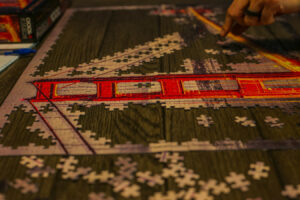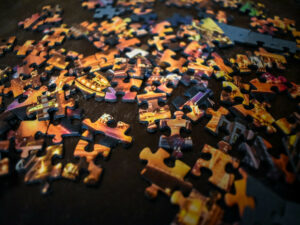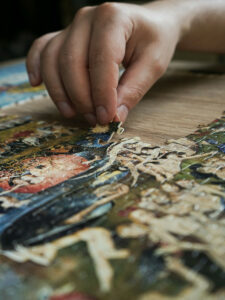Looking for Competitive puzzling tips? Or maybe a few tricks to better your speed puzzling times? It’s safe to say everyone who is serious about speed puzzling wants the chance to be part of a speed puzzling championship. However, before you can even enter in the desired event of a puzzling contest, you need to be at your best. Completion times are what makes or breaks a puzzling contest
In My Speed Puzzle World Every Piece Counts

For years I’ve been involved in puzzles and I know a thing or two when it comes to competitive puzzling. I’ve been watching speed puzzlers and working on my game personally. I’ve shared my puzzling contest tips with friends and family, but I’ve always wanted to do more with this information as I know it’s helped me! That’s why I started my little speed puzzling site here and why I put together this competitive puzzling tips and tricks list too! I believe the more you know, the better you will play!
Table of Contents
What is Competitive Puzzling?
Competitive puzzling, also known as competitive puzzle solving or speed puzzling, is a recreational activity or sport where participants compete to solve puzzles in the shortest amount of time or with the highest accuracy. These puzzles can vary widely in their nature and complexity, the the winner of puzzle competitions is based on how fast the jigsaw puzzle is completed within the constraints of each event’s rules and time limits. There are official jigsaw puzzle competitions and then there are other fun ones.
What is Speed Puzzling?

Speed puzzling refers to the activity of solving puzzles as quickly as possible. In speed puzzling, participants aim to solve the jigsaw puzzles while minimizing the time taken. It often involves competitive puzzle competitions where individuals or teams compete against each other to see who can solve the given puzzles in the shortest amount of time.
Speed puzzling requires not only sharp problem-solving skills but also the ability to think quickly and efficiently under pressure. It’s a challenging and exhilarating pursuit that attracts enthusiasts who enjoy the thrill of racing against the clock to conquer puzzles of all kinds.
Speedy Puzzling: Completion Times Matter
When it comes to competitive puzzling, the completion times matter. You might be considering how sorting the pieces, the jigsaw puzzle image, piece counts, or even the puzzle image matters. And ALL of those elements matter, but it’s all bundled up into the completion times to matter. If you are in an adult division or even an adult pair, you are in a puzzling contest that requires speed and preciseness.

My Growing List of Competitive Puzzling Tips
As I grow as a speed puzzler, I know that I need to keep looking for new information to better my game. I’ve found that being part of this sport has allowed me to learn so much. What I truly hope is whether you are in the adult division of a competitive puzzling event or playing with friends, these tips and strategies help your competitive puzzling too.
Here’s a comprehensive list of 68 competitive puzzling tips and tricks for speed puzzling:
- Familiarize yourself with different types of jigsaw puzzles: Look at the brands, the colors and other considerations. If you are familiar, you will find a comfort level even if you’ve never played the jigsaw puzzle before.
- Start with easy puzzles to build confidence and speed. I started with 100-piece puzzles. When I conquered speed, I graduated to 250-piece, 300-piece and so on. This allows you to understand how jigsaw pieces fit and when they get smaller, it gets easier.
- Practice regularly to improve your solving skills. Practice is essential. Yes, practice!
- Develop a systematic approach to solving puzzles. Look for systems. See what fits your style
- Work on improving your concentration and focus. Consider how you can block out noise, distractions, interruptions and still be moving the pieces into place fast.
- Use a timer to track your progress and set goals for improvement. Find a timer you like. Don’t just settle for the cell phone timer. Get a real clock used for your play (and only your play.)
- Break down larger puzzles into smaller, manageable sections. Sections make the puzzle pieces come together faster. Manageable is relative. Try different ideas for visual elements.
- Develop strategies for different types of puzzles. No two puzzles can be solved the same way. Know what strategy works for you and focus on those types of puzzles.
- Learn common patterns and techniques used in puzzle solving. Common patterns are a great way to beat the clock. Indulge yourself in practicing techniques for patterns.
- Solve puzzles in a distraction-free environment. I wish this was true for puzzle competitions, but you can focus distraction-free at home, then slowly bring in real world elements.
- Keep calm and stay patient, especially when faced with challenging puzzles. Don’t let your nerves stress you out. Stay calm, use your wits and rethink the challenge you face.
- Learn to recognize when you’re stuck and take a break if needed. A break in a competition? A sip of water. Looking up. Or thinking about the song you are listening to can be brief.
- Experiment with different solving techniques in posture to find what works best for you. Standing, sitting or leaning over? How you feel does matter when you are solving a puzzle.
- Talk to yourself when you are trying to decipher a jigsaw piece. Nothing crazy about talking to yourself when it comes to making the pieces fit.
- Use logic and deduction to eliminate possibilities and narrow down solutions. Visually, you need to logically consider what goes where and why. Narrow your solutions by simply thinking it through.
- Look for clues and hints provided by the puzzle Patches of color, obvious details and other visual likeness that can be spotted even when the pieces are all over the table.
- Scan the entire puzzle before starting to identify any obvious starting points. It’s important to look at the pieces, the colors and the shapes just to get an idea of where to start.
- Work on improving your speed without sacrificing accuracy. It’s important to practice accuracy with vision techniques and pattern strategies.
- Consider a partner, even if only for practice times. You will learn more techniques that you might not have even considered before.
- Learn to celebrate the small decreases in speed times. Every time you do better, take time to pat yourself on the back and enjoy the win.
- Look for ways to practice visual exploration to further identify pieces outside of your immediate vision. When used wisely, you will be able to see colors and shapes in the corner of your eye.
- Improve your engagement when in competitions but creating environments different than where you typically play. There is no shame in taking the jigsaw practice on the road.
- Use online resources and apps to practice and solve puzzles. Practicing speed by focusing on identifiable shapes is useful on the jigsaw apps too.
- Read about interesting ways other people are playing and offer strategies and tips like on SpeedPuzzlingTips.com
- Participate in small, friendly puzzle competitions to challenge yourself and improve your skills. Even with a puzzle pal, a competitive puzzling competition can help you focus on skills.
- Analyze your solving process after completing a puzzle to identify areas for improvement. Keep notes on what you were frustrated with, how you stumbled and what you want to do differently.
- Learn from your mistakes and try to avoid repeating them in future puzzles. In practice recreate the steps that you saw were errors and strategize how you can avoid that type of play in the future.
- Develop your own system that works best for you. The competitive world has no set way of solving a jigsaw puzzle fast. You can build off the skills you have and adjust for your best time.
- Experiment with different solving orders to see what works best for you. Sometimes the competitive puzzling sequence makes all the difference.
- Practice mindfulness techniques to stay focused and relaxed while solving puzzles. Make sure every jigsaw puzzle you solve you are in control of the pieces. Breathing techniques and focus will help.
- Take breaks during longer puzzle sessions to avoid mental fatigue. Unless you have competitive puzzling rounds, make sure you take down time to avoid mental fatigue. At puzzle competitions, I always leave my socializing until after the competition and rest between the rounds.
- Stay organized by keeping your puzzle materials and tools in one place. Don’t be looking all over for items you need to win. Put them in a basket, drawer and/or container. I always keep my lucky earbuds in my puzzle purse and never use them outside of competition or practice.
- Use technology to your advantage, such as using puzzle-solving apps or online resources. There is nothing wrong with learning as much as you can about the hobby and applying it to your game play. It means you are out to beat your best time!
- Stretch, before and after game play. It helps your body adjust to the focus you need for playing and allows you to be ready for what you mind needs to accomplish.
- Improve your spatial reasoning skills to solve jigsaw puzzles more quickly. The understanding of how objects can move in a 3-dimensional world helps when solving a puzzle.
- Work on improving your memory to retain where pieces set so you can scan quicker and more precisely in a puzzling contest.
- Practice visualization techniques to mentally manipulate puzzle elements. In your minds eye you need to be able to see pieces as if they were already locked in. Practice helps this skill immensely.
- Challenge yourself with puzzles that are slightly above your current skill level. But don’t get frustrated. It’s a way to grow as a speed puzzler and still have a good time.
- Set specific, achievable goals for each puzzle-solving session. Are you beating your best time? Will you be trying to be at the top of the leaderboard? Do you want the best time for the puzzle being played?
- Learn from experienced puzzlers by studying their techniques and strategies. Watch a few of the competitive puzzling events to see how other people play jigsaw puzzles so fast.
- Practice makes perfect – the more you solve puzzles, the better you’ll become. Solving puzzles is important, but make sure it is the right jigsaw puzzle. You can’t beat your best time if you are playing a puzzle that isn’t comparable.
- Focus on one puzzle at a time to avoid feeling overwhelmed. There is no need to be over practicing. Just one puzzle at a time is the best for any practicing.
- Stay flexible and be willing to adapt your solving strategy if needed. Be honest with yourself and look for ways to help your time. From starting with how you are sorting the pieces to if you started with the edge, adapt to see how it feels and what works.
- Develop a routine or schedule for your puzzle-solving practice. If you look forward to your practice time you will put your full effort into it. Develop a routine to make your jigsaw puzzling a priority.
- Take notes as you solve puzzles to keep track of your progress. The more you notice (including how you feel about certain aspects of your playing experience) the more you can explore to make your time better.
- Analyze the jigsaw puzzle box (if you like using the picture on front) to help your puzzle play. If you make a mental note of unique aspects of jigsaw puzzle before you begin you might be surprised how much faster you can go
- Use process of elimination to narrow down possible solutions. If you practice your skills regularly, you will find it’s second nature when using the process of elimination.
- Don’t be afraid to guess if you’re unsure – sometimes taking a risk can pay off. It’s a good idea to take chances as that is how you sometimes better your score!
- Stay positive and motivated, even when faced with challenging puzzles. Sometimes you have great play and sometimes you don’t. Make the most out of every time you play jigsaw puzzles.
- Set time limits for yourself to encourage faster solving. If you know what you need to beat before you begin, it will help you visualize you accomplishing the goal.
- Practice mental agility exercises to improve your problem-solving skills. You can find a number of great exercises, outside of jigsaw puzzling, that help improve your problem-solving skills.
- Go to the jigsaw puzzle section of your local store and check out the latest jigsaw puzzles. Alternatively, you could check online. Look for images and designs you would like to solve in the future.
- Develop a strong foundation in your style and create a schedule to take on complex puzzles, that are beyond your skills, and invite over other puzzle players to help you play.
- Challenge yourself with new types of puzzles to keep your skills sharp. Even if you decide on logic puzzles, mathematic puzzles or even traffic, the ideas of how to problem solve will help your game.
- Collaborate with friends or family members on puzzles to share strategies and tips. Invite them over to have a meal, enjoy a drink and share how they see puzzles (you will be surprised to hear how they actually think about solving jigsaw puzzles.)
- Take breaks and stretch regularly to avoid physical discomfort during long puzzle sessions. Make sure your body isn’t uncomfortable during play so you can focus on your game and relax afterwards.
- Stay hydrated and nourished to maintain peak mental performance while solving puzzles. A glass of tea, a bottle of water or a cup of coffee can keep you hydrated and alert.
- Get plenty of rest to ensure you’re well-rested and alert when solving puzzles. Sleep might be the last thing you think about when it comes to competitive puzzling, but you need to be refreshed and ready to play.
- Use a timer to track your progress and challenge yourself to beat your own records. It’s important to track your progress to adjust and focus on your times.
- Experiment with different solving techniques to find what works best for you. We are all unique so don’t be surprised if the techniques you have to solve puzzles work better than others you try.
- Practice playing jigsaw puzzles in the woods. Technically, you probably should just take a puzzle when on vacation or camping. It’s an entirely different experience.
- Consider what your goals are for completion times. Figure out where you would like to see your completion times in 3 months, 6 months and even a year from now.
- Look for clues and hints provided by the puzzle creator and puzzle brand. Use these clues to your advantage and play the puzzles that work best with your skill set.
- Scan the entire puzzle before starting to identify any obvious starting points. If you can’t find an obvious starting point, know where you might start next. Would it be on the edge? A particular color? Have a plan ready for action.
- Work on improving your speed without sacrificing accuracy. Develop a plan to improve your skill and consistently strive to that goal.
- Develop a good habit when playing puzzles and maintain positivity always. Don’t listen to outside people who mock or badmouth your joy. Wish them well, decline being in their company further and refrain from embracing their negativity.
- Video tape your competitive puzzling and play it back to see where you can improve. Sometimes a playback will reveal issues you didn’t even know you were battling (plus it’s pretty cool too).
- Enjoy the process and have fun challenging yourself with puzzles! Competitive puzzling can be a blast so have a great time
Speedy Puzzling: Use Your Strengths; Refine Your Weaknesses
Competitive puzzling doesn’t happen overnight. You gradually become better, redefine your skills and before you know it, you have an impressive amount of jigsaw puzzle completion times. Make the competitive puzzling focus about how you can improve your best time and watch your fun increase at every puzzle competition you attend.
